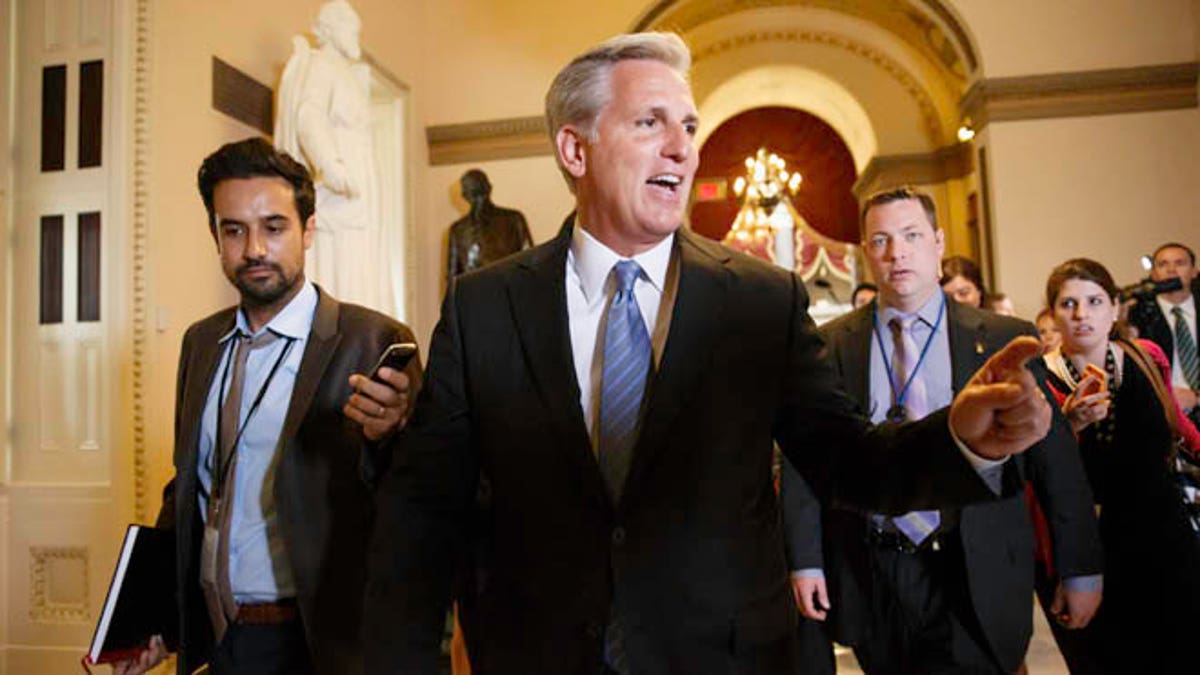
June 11, 2014: House Majority Whip Kevin McCarthy leaves House Speaker John Boehner's office on Capitol Hill in Washington. (AP)
House Republicans are putting a new team in place.
The House Republican Conference convenes a closed-door meeting Thursday afternoon at 2 p.m. to select the next majority leader and, possibly, a new majority whip.
The stunning primary defeat last week of House Majority Leader Eric Cantor, R-Va., set this state of affairs into motion. Cantor will remain as majority leader through July 31 and remain in office for the remainder of this Congress. However, a new leader will take charge as of Aug. 1.
House Republican Conference Chairwoman Cathy McMorris Rodgers, R-Wash., will chair the meeting. Up first is the race for majority leader, where House Majority Whip Kevin McCarthy, R-Calif., faces Rep. Raul Labrador, R-Idaho.
The voting is secret. Members will write the names of their preferred candidate on slips of paper. There are currently 233 members of the House Republican Conference. So 117 technically is what's needed to win, though the actual number could be lower when absences are factored in.
McCarthy is believed to be way ahead. But there is a bloc of 40-60 Republicans, mainly rock-ribbed conservatives, who are likely to vote for Labrador as the "alternative" candidate to the "establishment." This is the same faction of Republicans who have voted against most major policy initiatives -- be it raising the debt ceiling, funding the government, a transportation package, agriculture bills and hurricane relief. This is a protest vote.
One Republican will deliver a nominating speech for McCarthy followed up by to two "seconding" speeches. The same for Labrador. The candidates themselves do not address the conference. That happened earlier at the "candidates forum."
Then the vote.
It's possible there could be write-in candidates or others who are not formally announced.
The House GOP Conference will appoint three "non-affiliated" tally clerks to tabulate the vote. The clerks will then count the vote. The announcement will be made in the room.
Riva Litman,, the deputy communications director for the conference, will then announce the winner to the press.
If McCarthy matriculates to leader, the conference immediately moves to the whip race since there's a vacancy there. (If Labrador wins, everything is done. Labrador will be the new leader and McCarthy remains where he is. This is what happened on Feb. 2, 2006 when John Boehner hop-scotched then-House Majority Whip Roy Blunt, R-Mo., to become majority leader. They were expecting a whip contest since Blunt was favored. But everything stopped in its tracks when Boehner earned the promotion and Blunt remained where he was.)
But if McCarthy moves up, then Chief Deputy Whip Pete Roskam, R-Ill.; Rep. Steve Scalise, R-La.; and Rep. Marlin Stutzman, R-Ind., are running for his old job.
The race is tight, with Scalise believed to be in the lead. But Roskam is in striking distance. The wild card is Stutzman. Stutzman's camp argues disenchanted conservatives could break for the Indiana Republican if Scalise or Roskam fail to close the deal. Roskam appears to be leaning on a "second-ballot" strategy. It's thought that Scalise and Stutzman could divide their supporters, with Stutzman having to drop out if he finishes third in the first round.
That means Scalise fails to capture the majority on the first ballot, thus presenting Roskam with a chance to surge ahead. But some political observers believe Scalise could inherit many of Stutzman's supporters on a second ballot with Stutzman out of the race.
At the end of the meeting, the entire leadership team, including the speaker, is expected to speak to the press.
Could there be hiccups? Sure. Recall a funny moment from the 2006 leadership race:
After the first ballot, Republicans couldn't figure out why they had more total votes than they had members in the House Republican Conference. The issue was that then-Del. Luis Fortuno, of Puerto Rico, was a member of the House Republican Conference, but not a full voting member of the House. He couldn't vote on the House floor, but he could vote in the GOP conference. The conference forgot to consider this when considering how many eligible voters they had. This caused some problems and scrambling around until they settled the issue ... and took the vote again.
But there were a few moments where they thought someone was stuffing the ballot box.
"It turns out we're not corrupt," quipped then-Rep. Jeff Flake, R-Ariz., at the time. "Just incompetent."
Capitol Attitude is a weekly column written by members of the Fox News Capitol Hill team. Their articles take you inside the halls of Congress, and cover the spectrum of policy issues being introduced, debated and voted on there.










































